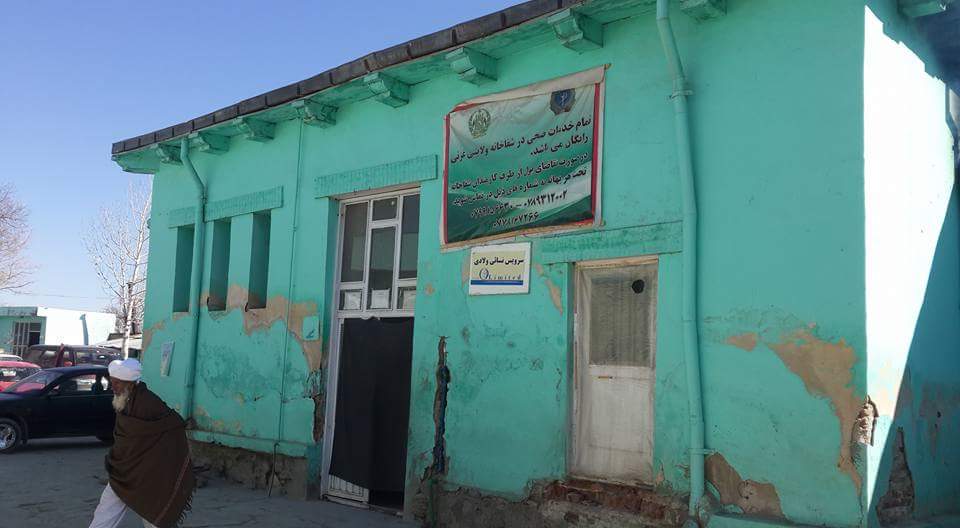GHAZNI CITY (Pajhwok): Residents of far-flung areas in southern Ghazni province transfer their female family patients to kilometers away to district centers or the provincial capital against an artificially increased taxi fare.
The people in remote area say at times it takes a whole day to find a taxi for shifting a female patient to hospital to other areas because health facilities are not available in their own areas.
Gbazni public health officials acknowledge the lack of female doctors and nurses in remote parts of the province, but they say newly graduated midwives have been dispatched to clinics the districts.
Kamal Shah, a resident of Giro district, said there was no female doctor in their locality and he had to transfer his wife to the civil hospital in Ghazni City.
“Forget about female doctor, there is no clinic in our area. For a small health issue, we have to shift our females to Ghazni City or Andar district.”
Some years back health facilities were destroyed in Giro district due to incidents of violence and conflict. Kamal Shah said security situation on the Giro-Ghazni City road was not good, making it hard to convince drivers to travel on the road.
“You have to spend almost a day to find a car for transferring the patient. When someone agrees he demands high fare while people’s economic situation is also not good.”
Asadullah, a resident of Andar district, said the lone clinic in their district was without female doctors.
“The government should ensure security of doctors so they could travel to far-flung areas. Only midwives are not enough,” he said.
He said they could not shift female patients to the city or other areas during night due to security issues. “This is another huge problem, most of the patients lose lives as they don’t reach hospital.”
“Sometimes the Taliban don’t allow vehicles to proceed to the city and this is another big issue,” he said.
Fatima, a resident of Waghaz district, said she a few months back she suffered from a stomachache.
“It was midnight when suddenly I started feeling pain in the lowe-right abdomen and whatever we had in the house I ate but there was no relief and I screamed the entire night.”
“After the medical examination at the civil hospital it was found I had appendicitis and the appendix was removed”, she said.
According to Fatima, the doctor told her that she would have died had she reached a few hours late to the hospital.
Residents of Deh Yak, Ajiristan, Maqur, Qarabagh, Aab Band and Khogyani districts also complain they are facing many problems in access to health services.
The residents have asked officials concerned to resolve their healthcare problems.
On the other hand, Mursal, a midwife from Khoygani district of Ghazni, told Pajhwok that female doctors and midwives could not work in remote districts due to security problems.
“I have duty here in Khogyani, my own district, but if the security situation improves doctors from other areas will also come here,” she said.
She said even men specialists could not work in remote areas fearing for their lives. She urged militant groups to shun insurgency so specialist doctors were able to serve people all parts of the country.
Public health director Zahir Shah Nikmal told Pajhwok they were struggling with the shortage of female doctors while there was no shortage of midwives in Ghazni.
“Female doctors are serving only in four districts (Malistan, Jaghatu, Khwaja Omari and Jaghori) while midwives are working in all districts of Ghazni,” he said.
“Midwives cannot diagnose all health cases of women but they can help in dealing with patients,” Nikmal said.
He also said female doctors had no interest to serve in districts due to security problems.
“We are trying to find a solution to this problem” he said without going into details. He said they were trying to reopen the health center in Giro district.
Provincial police chief Brig. Gen. Mohammad Zaman said the security situation was not bad in districts and female doctors could work there.
“The government is responsible to ensure security for the public, we also assure doctors we can provide a safe environment for them and they can work in any district,” he said.
But the governor’s spokesman, Mohammad Arif Noori, said female doctors were not allowed by their families to work in remote areas and they used security problems as an excuse.
“District centers are in bazaars, so there are no security problems when the district administration is operational there,” he added.
“If female doctors face security problems in their movements, they can ask security forces for help.”
On the other hand, a Taliban spokesman, Zabihullah Mujahid, said the Taliban never created problems for female doctors.
“We have repeatedly asked healthcare officials to employ female specialists as well, therefore we do not pose any problems to them,” he said.
Ghazni is one of the most unstable provinces of the country, a reason people complain about lack of basic services.
nh/mds/ma







GET IN TOUCH
NEWSLETTER
SUGGEST A STORY
PAJHWOK MOBILE APP